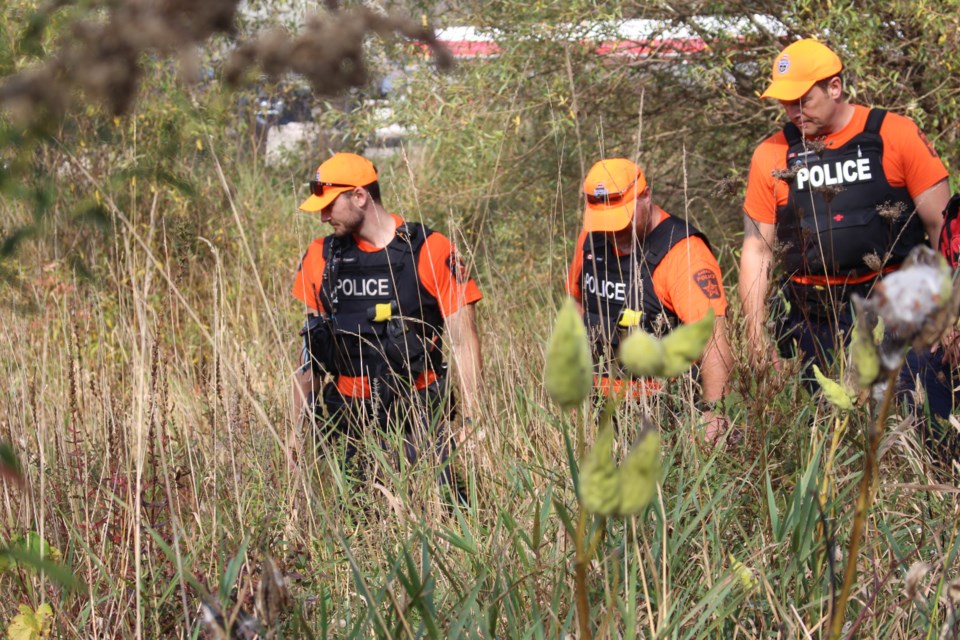It takes a keen eye to notice the small details and even those who are specially trained for it need a refresher from time to time.
The 28 members of the Barrie Police Service emergency support unit participated in a special training exercise today along Tiffin Street to hone their search-and-rescue skills and locate “evidence” in a hypothetical scenario involving a missing person.
“Anybody can look for something, but effective search is done when you sharpen those skills on a regular basis. You learn to not just look for what you see when you’re moving forward, but stopping every five feet and look back,” Const. Jamie Saunders, one of the unit’s search managers, told BarrieToday.
“This gives you a different perspective and it changes what you see. We want to keep (the team) in the mindset that we are actually searching for something and to care about what you’re looking for," he added.
"Anybody can go for a walk and miss stuff. It’s about being a trained observer.”
The officers, who were divided up into groups, were each assigned different areas by one of the four search managers on scene, explained Barrie police communications co-ordinator Peter Leon.
“Each team was assigned an area to search and are checking all the ditches, etc., and trying to identify anything that would point to the missing person having been in that area,” said Leon.
Thursday’s training exercise was just as thorough and methodical as a real-life scenario would be, he added.
“It’s labour-intensive because you’re covering a large area, but you’re not walking briskly through it," Leon said. "You’re walking through all of the brush and looking down. This time of year it’s a little bit easier, but in the heat of the summer or in winter. things can be hidden, so it’s important to do it slowly.”
After each team completed its assigned search area, they would return to the command post, check in with their search manager, before heading back out to their next assigned spot.
In this exercise, officers were searching for pieces of evidence, as well as the victim, all of which were located in various spots prior to the beginning of the search, noted Leon.
This type of training allows them to combine all the situations they have encounter as a police service in the past and use them in a training situation, he added. Ultimately, officers are then able to put all these plans into motion in a real-life situation and hopefully allow them to locate a real missing person or evidence.
“It creates a more dynamic training situation. We use the analogy of leaving no stone unturned, but the reality of it is evidence could get discarded, blown in a ditch and get caught under something, so officers are out there with their batons and are raking through the foliage and the ground coverage," Leon said. "Searches can go hours or they can go days.
"Until they’re completely satisfied, they will put every resource we have in order to bring that person back.”
A few hours into Thursday's training exercise, one of the search teams located the “victim” hidden at the back of the property. The volunteer “victim” was unresponsive and had been stabbed, explained Saunders.
Once the “victim” was located, the scenario was paused until all teams could return from their searches, and benefit from the rescue part of the exercise, as well as learn how to treat the victim.
“We have 16 new members, so we are just trying to get everybody up to speed so we are all singing from the same song sheet,” Saunders told BarrieToday.
“It’s really no different than the analogy of a knife in your kitchen. You take a knife and slice vegetables. Every once in a while, if you really want to be efficient with that knife you have to sharpen it. It’s no different for us.”



